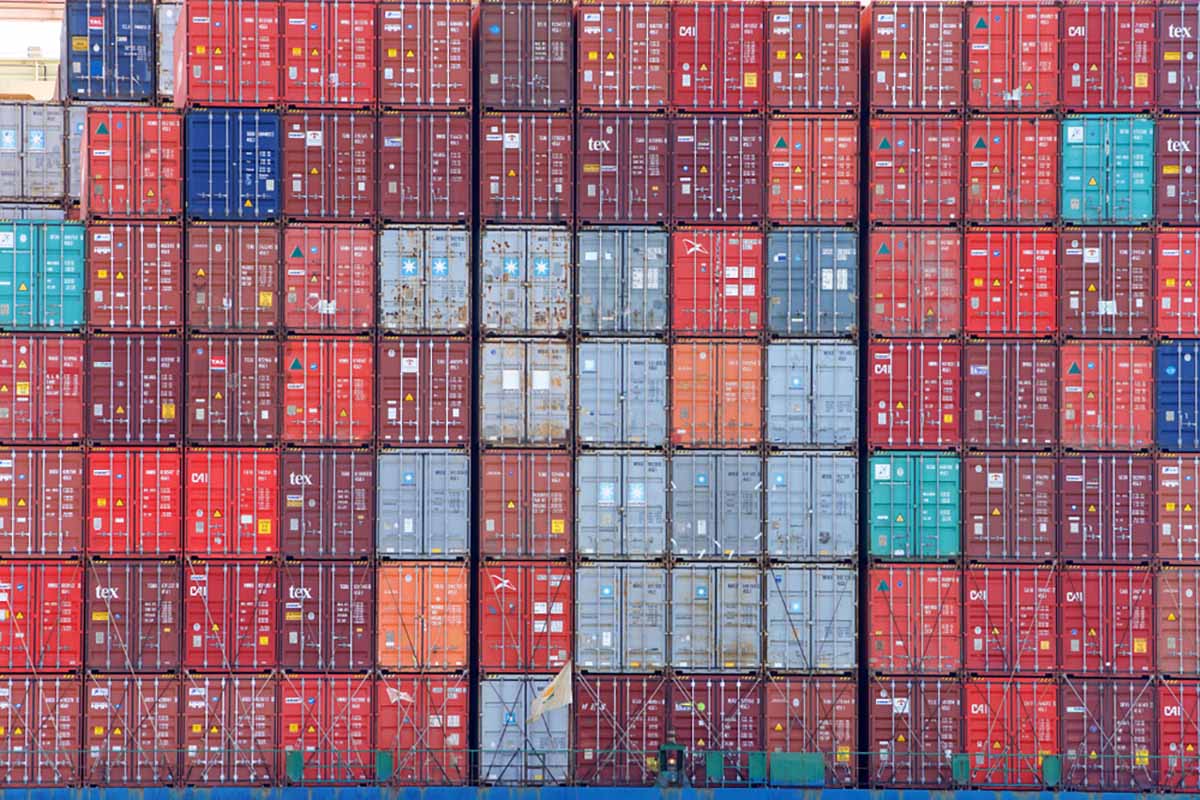
Analysts say that new Chinese import regulations covering recycled pellets have created challenges for exporters of the material. | Sheila Fitzgerald/Shutterstock
In the U.S., the plastics recycling market has been largely dictated by pandemic-related collection and demand realities. Overseas, a recent Chinese move to restrict recycled plastic pellet imports is posing trade challenges.
The Bureau of International Recycling (BIR) hosted a recycled plastic market discussion as part of its virtual World Recycling Convention Week 2020. Experts in the plastics recycling industry gave a rundown of recent market forces during a particularly turbulent year.
“It’s been a rollercoaster of a ride here in the States, in terms of plastics markets,” said Sally Houghton, deputy executive director of Plastic Recycling Corporation of California (PRCC).
Pandemic has substantial impact on recycling
In the U.S., where there have been more than 8.2 million COVID-19 cases and more than 220,000 deaths, the pandemic affected numerous parts of daily life, including recycling availability.
“It started off with many of the recycling collection systems shutting down or reducing their operating hours,” said Houghton, whose firm brokers bales of recovered PET bottles for suppliers across California. Drop-off centers shuttered, and some curbside programs suspended service, primarily in the early spring.
Many sites have since reopened with new operating protocols, and collection volumes have climbed back up, Houghton said.
The disruption impacted prices, first by driving them up and then bringing them back down. PET bales, for example, climbed during the collection shutdown as the supply was hampered and buyers struggled to find material. But once collection sites reopened and material was flowing into the system again, the “very low price of virgin PET soon corrected the bale prices and they fell again,” Houghton said.
Currently, PET pricing is seeing a slight increase due to an overcapacity of PET processing infrastructure in some parts of the U.S. and in Mexico, Houghton said. This demand growth has pushed up prices slightly.
One upcoming dynamic in the PET market is the recent recycled-content mandate passed in California, requiring certain percentages of RPET to be used in beverage containers in the coming years.
Houghton said that legislation may impact the market “as RPET and virgin start to decouple in terms of pricing.”
PET also saw a short-term slight uptick in pricing due to the impact of recent hurricanes in the Southeastern U.S., where resin manufacturers were disrupted, Houghton said.
The HDPE market has continued to bring high, competitive prices. Natural HDPE, for instance, has seen two major price run-ups in the past year.
The wild prices for recycled HDPE is largely due to production of HDPE virgin resin failing to meet demand, Houghton said.
PP recovery has seen “some encouraging growth in the U.S., with greater investment in sortation and end markets,” Houghton said. It’s still a growing market, she pointed out, with only about 25% of MRFs creating PP-specific bales.
“As with all recycling, with polypropylene the greater the sortation, the greater the value,” she said.
Overall, Houghton said COVID-19 has highlighted weakness in several key commodity markets and emphasized the need for modernization of the U.S. recycling system. As a positive note, she pointed to examples of these trends bringing more national attention on improving the recycling industry, through legislation, brand owner commitments and more.
Chinese pellet rules create uncertainty
Overseas, panelists highlighted new Chinese import regulations covering recycled pellets. BIR in September highlighted this emerging roadblock, describing it as Chinese officials “tightening the enforcement of the existing regulations regarding imports of recycled plastics pellets.”
Max Craipeau of Hong Kong plastics recycling firm Greencore Resources said shipments of reprocessed pellets from Southeast Asia to mainland China have been heavily affected. This is a particularly key trade relationship, as many plastics recycling firms relocated to Southeast Asia following China’s 2018 ban on importing raw scrap plastic.
These companies process scrap materials in Southeast Asia and have been shipping the finished pellets to buyers in China. But for now, that is a less feasible business venture.
“Importers are in a wait-and-see mode, waiting for clarification to avoid unnecessary hefty fines,” Craipeau said.
Steve Wong, executive president of the China Scrap Plastics Association, agreed that the recycled pellet import rules are having a stifling impact on Chinese pellet imports.
“Because of the situation in China, especially on the import control or enforcement of existing rules and regulations, recyclers are very reluctant to take this risk for importation of recycled pellet,” Wong said. “As a result, less recycled material is being imported into China, as well there’s almost no improvement on the prices.”
With the penalty for violating the new import criteria ranging from $70,000 to $700,000, “nobody would like to be the first one to be penalized,” Wong added.
Recycling firms in Eastern Europe were similarly impacted, where the industry is “quite dependent on the Chinese market,” said Andrei Sofian of Romanian recycling firm Rematholding Co.
Companies looking to move recycled pellets have taken two routes, Sofian noted. Some are looking at selling to buyers in Southeast Asia and India, but recently buyers in these markets want particularly high quality pellets for certain resins, Sofian said.
Other recycling firms are responding to the market disruption by buying and installing new equipment to expand their in-house processing abilities, Sofian said.
Beyond the pellet import restrictions, Craipeau noted that Chinese importers have been offering lower prices than buyers in India and European countries. And he predicted that is going to continue, in part because of laws requiring the use of recycled plastic.
“Mandated recycled-content regulation in place in Europe as well as in the U.S. tends to offer much better opportunity and incentive for local recyclers to sell their pellet locally,” Craipeau said.
He added that this will also likely become the case in China, where the government “clearly makes barriers to create incentive for local recycling.”
More stories about markets
- Bale pricing bucks seasonal trend, trade alliances shift
- Trex, Mohawk, Indorama report Q1 earnings
- Haulers share how weather, tariffs impacted Q1



